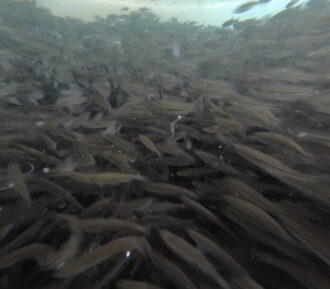University of Arkansas researchers are partnering with rice farmers in Arkansas to explore whether co-cultivating fish in flooded rice fields can reduce methane emissions and create an additional income source for growers. Supported by a $30,000 On-Farm Research Grant from Southern SARE, the three-year project tests whether adding fish to flooded rice fields during the winter fallow period can improve environmental and economic outcomes.
The project builds on work by the Resource Renewal Institute (RRI) in California, where initial “fish in the fields” trials demonstrated that integrating fish into rice paddies has the potential to reduce methane emissions by up to two-thirds. The University of Arkansas research team, led by bioengineer Benjamin Runkle, examined the use of the practice on large-scale rice systems in the largest rice producing state in the United States, introducing golden shiners as the test species.
While most research has focused on methane released during the summer growing season, winter emissions remain less studied. In Arkansas, nearly 30 percent of rice acreage remains flooded in the winter for ecological benefits, such as supporting migratory waterfowl. However, according to Sam Carroll, a graduate student who participated in the project, these flooded conditions can increase methane emissions by as much as 45 percent compared to non-flooded fields.
Researchers hope that introducing fish will lower emissions by disrupting the methane-producing cycle in flooded soils. Early results indicate that winter-flooded rice fields have the capacity to produce healthy fish biomass and may decrease methane emissions during the flooded period. But more work needs to be done to attribute those changes to the presence of the fish. Fish mortality, variable field conditions, and limited replication made it challenging to isolate the effect of fish presence. Nonetheless, overall methane levels during the winter period were significantly lower than during the summer, and lower than those recorded in comparable studies.
For more information, see Fish in the Fields Program Implementation Guide.
